In Turkey, Russians are welcome to visit — but it doesn't mean they can all stay
Nearly 150,000 russians are living in turkey with short-term residency permits.


Social Sharing
On a street in Istanbul's Kadikoy district, near the coast of the Sea of Marmara, a group of anti-war Russians wear blue and yellow ribbons, and other Ukrainian symbols, as they hand out flyers to advertise a fundraising event for children's organizations in Ukraine.
Nick, who didn't want us to use his last name, had a Ukrainian flag tied around his neck while taking part in the gathering on May 19. But when a police officer turned up to inquire about what they were doing, he hastily slipped away down a side street.
He returned a few minutes later when the officer was gone.
"This was a stressful moment," he told CBC News.
The 18-year-old has been living in Turkey without proper documentation after his short-term residency application was rejected by the Turkish government.
He is part of a group of Russians who left the country because they disagreed with the war and didn't want to end up fighting in it, but have limited options of where to settle.

Turkey has always been a prime destination for Russians. Its warm weather and idyllic coasts, along with visa-free travel for tourism and business attracted seven million Russian visitors a year before the COVID-19 pandemic.
However, after Russia launched its full-scale invasion of Ukraine, tens of thousands of Russians moved there, or are at least staying temporarily to escape the prospect of mobilization.
There are now nearly 150,000 Russians living in Turkey on short-term residency permits, which are required for any stays longer than 60 days.
Residency rejections
Earlier this year, there were reports on social media and in Russian independent media that more Russians were being denied residency permits, which would allow them to stay legally for at least a year.
While official information was not released by Turkish authorities, the apparent rejections came amid public criticism about the rising cost of housing in Antalya, a city along the Mediterranean coast and a preferred destination for Russians.
An online petition, signed by over 20,000 people, called for foreigners to be shut out of the housing market.
According to government statistics, across Turkey, housing sales to foreigners increased by 15.2 per cent in 2022. Russian citizens were the most prevalent buyers, purchasing more than 16,000 properties last year.
Russians who have had their permit applications rejected are in disbelief, and unsure of what to do next.
"I was completely destroyed … depressed," said Albert Sarkisiants, in an interview with CBC News on May 13.
Sarkisiants had his residency application rejected in December, three months after he flew out of Russia to avoid being drafted.
Fleeing mobilization
He had booked a ticket out of Russia for Sept. 27, because he suspected the country would introduce a mass-mobilization campaign after it annexed four Ukrainian territories .
But after Russia's President Vladimir Putin announced a partial mobilization on Sept. 21, he bought a ticket to Istanbul and flew out right away with just his backpack and his passport.
"As a person who served in the Russian army I had a big risk of being mobilized," he said.
Sarkisiants served a mandatory year of military service, where he said he "wasn't even allowed to use rifles." But now, he says that wouldn't save him from being sent to the front line.
He found an apartment and prepaid his rent for six months only to have his application for residency rejected. Oddly, he says his wife's application, which was nearly identical, was later approved.
Sarkisiants, who was working on his PhD in philosophy in Russia and is currently not earning any substantial income, lives off money from renting out his Moscow apartment.
"It is not a pleasant experience to live illegally," he said, adding there aren't any good options at the moment.
- A new law makes it harder for Russians to dodge the draft
- Russia says little about its soldiers dying, so an open-source team is trying to keep track
He won't go back to Russia given that the country has now introduced an electronic draft system which bans men from leaving the country from the moment the summons is delivered online.
Sarkisiants also says he was arrested twice for protesting in the days after Russia launched its invasion, and if he were to return and speak out, he could face years in jail.
His plan is to stay in Turkey for now, but relocate to Serbia eventually. He knows once he leaves the country he will have to pay an administrative fine for residing there without the proper documentation.
Sarkisiants says living in Turkey illegally creates all kinds of worries around accessing heath care and other services. But he says even Russians with permits still live with the uncertainty of how long they can stay separated from their family.
Subbotnik off the coast
CBC News spoke with Sarkisiants on an island off the coast of Istanbul where he and a group of recent Russian émigrés were cleaning up garbage as part of a social outing.
The event billed was a subbotnik , which refers to the Soviet tradition of doing volunteer work on a Saturday.

It was organized by Denis Agenorov, 37, who left his wife and dream job in environmental sustainability behind in Moscow for Istanbul, where he has been living for months with no income.
He has applied for dozens of new jobs, but has only received a few interviews and no offers.
He says he has found Turkey very welcoming, and wanted to organize the coastal cleanup as a way of giving back and helping Russians connect with each other as they grapple with the consequences of the invasion.
"I think I just haven't dealt with it yet mentally," he told CBC News. "It will take a lot of years to realize what has happened as a nation, really."

Alongside him picking up small pieces of garbage near the water was Andrei Gamov, 35, who left his wife and three-year-old daughter in Moscow, along with an engineering job at Russia's energy giant Gazprom.
He has a permit to stay in Turkey and has found work outside of his field, but says his future is full of uncertainty.
"It's so stressful … to leave your home country, to lose language, your friends, your relatives," he said.
"We are victims, too, because we are forced to leave.… But, of course, Ukrainians are the main victims."
ABOUT THE AUTHOR

Foreign correspondent
Briar Stewart is CBC's Russia correspondent, currently based in London. During her nearly two decades with CBC, she has reported across Canada and internationally. She can be reached at [email protected] or on X @briarstewart
With files from Corinne Seminoff and Reuters
Related Stories
- Ukraine takes plea for more weapons directly to Canada's defence sector
- 5 killed in shelling in Russian-occupied eastern Ukraine
- Skip to main content
- Keyboard shortcuts for audio player
Thousands of Russians continue to arrive in Turkey, fleeing conscription
Fatma Tanis

Matryoshka doll statues near a Mediterranean Sea beach in Antalya, Turkey, on Aug. 7. This small park is known as Matryoshka Park. More than half the traditional Russian dolls are missing since vandals destroyed them after Russia invaded Ukraine. Diego Cupolo/NurPhoto via Reuters hide caption
Matryoshka doll statues near a Mediterranean Sea beach in Antalya, Turkey, on Aug. 7. This small park is known as Matryoshka Park. More than half the traditional Russian dolls are missing since vandals destroyed them after Russia invaded Ukraine.
ANTALYA, Turkey — Near Antalya's Mediterranean Sea beach is a small park known as Matryoshka Park, for its large sculpture of traditional Russian nesting dolls. More than half the sculpture's dolls are missing now, since vandals destroyed them after Russia invaded Ukraine.
Turkey is one of the countries where Russians are fleeing conscription, following Russian President Vladimir Putin's plan to mobilize an additional 300,000 troops to bolster his war in Ukraine. The exodus can be felt acutely in Antalya, a large city on Turkey's southwestern coast. It's a longtime Russian tourist destination that's now becoming a refuge for those who don't want to fight in the war.
Anti-war Russians began moving here in March, shortly after their country's invasion of Ukraine. The current influx is larger and known as "the second wave" among the local Russian community. Whole neighborhoods in the area near Matryoshka Park are mostly Russian now. It's the language heard on the streets and seen on signs and restaurant menus.
Two young Russian men wander around the park, looking as though they have just stepped off the plane — carrying backpacks and dressed for much colder weather than Antalya's 90 degrees Fahrenheit. Like many Russian men around the city nowadays, they are easily identifiable as having fled the draft, with their meager belongings, winter outfits and stunned expressions.
These two men are from Kazan, in the semi-autonomous region of Tatarstan in southwest Russia. They don't want to reveal their names, fearing retribution from the Russian government.
"It's dangerous for any male," says one of the men, who is 25. "Doesn't matter if you're old, have more than three kids and no military experience. All men are in danger."

Tourists, coming mainly from Russia, at the arrival terminal at Antalya International Airport in the Mediterranean resort city of Antalya on Sept. 22, the day after Russian President Vladimir Putin announced a draft for Ukraine. Kaan Soyturk/Reuters hide caption
Tourists, coming mainly from Russia, at the arrival terminal at Antalya International Airport in the Mediterranean resort city of Antalya on Sept. 22, the day after Russian President Vladimir Putin announced a draft for Ukraine.
As Tatars, they've heard that Russia's new conscription falls heavily on ethnic minorities like them, more so than on Russians living in the big cities like Moscow or St. Petersburg. They say they know many friends who were rounded up despite being staunchly against the war.
"This is a war of the Russian government, not the Russian people. My issue is not just the mobilization, it's the war. I have relatives in Ukraine and this is a disgusting situation for all of us," says the other man, who is 26.
Life is getting more complicated for Russians in Turkey
The men have been in Antalya for two weeks — having left Russia immediately after Putin's draft announcement — and still feel as lost in Turkey as others who've just arrived today. They've left their families behind and have no future plans. They've found no answers to their many questions.
"We need to solve a lot of problems, mainly about how to live in Antalya," says the 25-year-old.
Things have gotten more complicated recently for Russians in Turkey. Residency laws are getting tighter in the city, making it harder to live and work here legally.
Another big issue is money. After facing pressure and threats of secondary sanctions from the West, Turkish banks suspended the Mir payment system – the Russian version of Mastercard and Visa – which makes it harder for Russians to get currency or even pay the tab at Turkish restaurants.
There is only one cash transfer that Russians can access in Antalya — Golden Crown, a Russian transfer system. It's never without long lines of Russians in front, but the most they each can withdraw per day is $200.
Russian tourists are also opting to stay indefinitely in Turkey
Russians continue to come to Antalya in large numbers. According to the provincial governor, up to 19,000 Russians are arriving every day. Some are fleeing the draft and others are tourists who decide to stay.

The beach in Antalya on a recent Sunday. Fatma Tanis/NPR hide caption
The beach in Antalya on a recent Sunday.
Turkish tourism companies that work exclusively with Russians tell NPR they have seen a significant increase in single males booking long stays. But vacationers also are not boarding their planes back to Russia, and some flights are going back half empty.
One man who opted to stay is a 34-year-old from Moscow. He is afraid to reveal his name, but tells NPR that he bought a ticket to Turkey a few days after the draft, spending several thousand dollars and leaving in a rush. He didn't even have time to notify his bosses, who have no idea he's leaving the company.
"Tomorrow when I have a Skype call, I'm going to surprise them," he says, laughing.
Like all the other men of fighting age who've tried to leave, he too faced questioning by authorities at the airport in Moscow.
"I saw some people who were diverted from the floor and taken to a separate room," he says. "I couldn't see what happened to them but I have a feeling they were not allowed to leave."
He was among the lucky ones because he hadn't been drafted by the time he left — and he'd bought his flight as a tourism package so he could claim to be a tourist when asked why he was leaving.
But unlike other men who've fled to Turkey and told NPR they would never go back to Russia, this man says he will go back if Russia loses the war — which he believes can happen, as long as Russia sticks to conventional weapons.
"I will go back then, because we have to rebuild," he says. "We have to vote for new people who will choose a different way. And one day, maybe when I am old, people will visit Russia again, because it's a beautiful place."
The only choice he could make now, he says, was to leave and not be forced to kill people in a war he doesn't believe in.
- Russia-Ukraine war
Tourist destinations gear up for summer without Russian visitors
Greece, Turkey, and Cyprus face uncertain summer season as numbers of Russian tourists slump amid war on Ukraine.
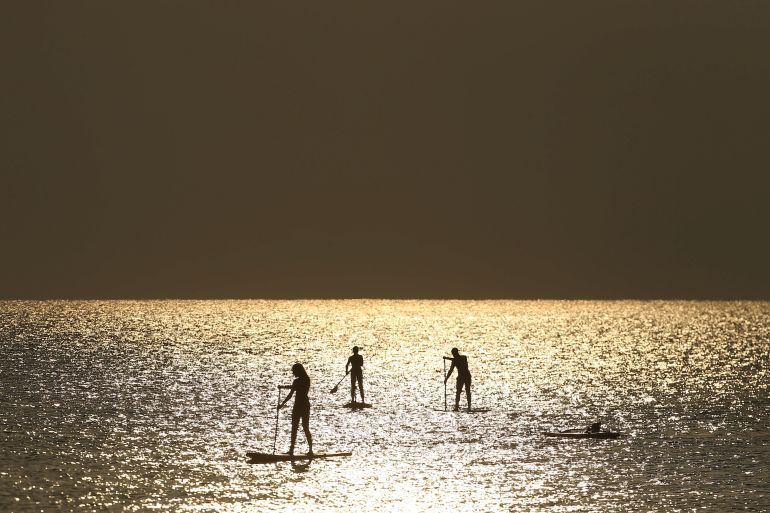
Athens, Greece – Key European tourist destinations are set for a summer season largely without Russian visitors amid sanctions over the war on Ukraine and actions taken by Moscow.
Russian President Vladimir Putin has sought to punish countries that have imposed sanctions against his country. On April 4, he suspended aspects of a 2006 visa facilitation agreement between Russia and “unfriendly” members of the European Union that have imposed sanctions against Russia after its invasion of Ukraine.
Keep reading
Putin ready to facilitate export of grains from ukraine: kremlin, french journalist killed during russian bombardment in ukraine, biden: us will not send ukraine rockets that can reach russia.
The following day, Putin issued a travel advisory urging Russians not to travel to “dangerous” European countries. He suggested they instead go to India, Turkey, Sri Lanka and other countries that have refused to criticise Russia’s invasion of Ukraine or to impose sanctions.
Yet, in Greece, many hoteliers and the government remain upbeat about tourism’s prospects.
“At our hotel, Russians have been replaced by customers mainly from the UK market,” says Manolis Elpidis, general manager at the Atlantica Caldera Palace in Crete. “The season has started very well. If it continues at the same pace, and other obstacles don’t crop up, business will easily reach 80 percent of 2019 levels,” he says.
That is the target set by the Greek government, based on the fact that tourism last year rebounded to 60 percent of pre-pandemic levels.
In Greece, Russians accounted for only 0.8 percent of arrivals and 1.1 percent of receipts last year, Bank of Greece data show .
“Greece is a destination that’s in very high demand. In many countries it is the preferred destination,” Sofia Zaharaki, deputy tourism minister, told Al Jazeera. “We are seeing that there is a diversification of nationalities which means we have more incoming tourism from other countries.”
Greece is not only seeing arrivals that approach those of pre-pandemic levels; it is seeing a rise in revenue.
“There’s a 27 percent increase in average spending per trip in 2021 compared with 2019. Some people may not have travelled [in 2020] due to the pandemic, and may have had more money in savings, so we’ll have to see if that’s a continuing trend,” says Zaharaki.
Greece will spend 71 million euros ($76.2m) subsidising domestic tourism for lower-income households this year, 31 million more than it spent last year. Zaharaki believes this will help offset the loss of 115 million euros ($123.4m) Russians spent there in 2021.
Turkey set to struggle
Meanwhile, Turkey is set to be hit hard – despite its attempts to stay neutral in the war and its opposition to sanctions on Russia.
Turkey, the world’s top destination for Russian tourists, received four million Russian visitors last year and hoped for six million this year but now forecasts a possible two million, and a loss of $3-4bn in tourism revenues. The reason is that sanctions have blunted Russians’ spending power.
The Turkish government has lined up $300m in loans for hospitality enterprises catering to Russians. Its state airline increased flights to Moscow.
This caused some vexation in Kyiv.
“On the one hand, Turkey acts as a mediator and supports Ukraine with important steps, and on the other hand, we see, for example, preparing several tourist routes at the same time, especially for Russian tourism,” Ukrainian President Volodymyr Zelenskyy told Greece’s state broadcaster, ERT. “You cannot deal with it that way, it’s a double standard.”
Cyprus’ de-Russification
Cyprus, where Russian tourism has been growing in recent years, is also set to be affected. Russians made up a quarter of Cyprus’s two million visitors last year and brought in an estimated 290 million euros ($311.2m) – a fifth of the country’s tourism revenue.
Fiona Mullen, who runs Sapienta Economics, a consultancy, has estimated the effect of the absence of Russian tourists and high energy prices will lead to a net loss of 0.9 percent in the tourism market this year.
That might be relatively negligible if it was not for the fact that many Russians combine holiday-making in Cyprus with business activities such as investing and banking.
“Russia and Cyprus have longstanding links because of the Orthodox Church and the fact that Cyprus was part of the nonaligned movement in the Cold War,” says Mullen. “It had a good non-double taxation treaty with the Soviet Union, which carried on after 1990, so that generated a lot of business after the breakup of the USSR. And [Cypriots] don’t have the mistrust of Russia that NATO countries have.”
Russia’s footprint on Cyprus’s economy was once large. Before 2013, Russians accounted for 21.5 billion euros ($23.1bn) of Cyprus’s bank deposits. In February, that had fallen to 6.4 billion euros ($6.9bn).
But de-Russification, Mullen says, began with Cyprus’s banking crisis of 2013, when the EU stepped in to bail out the financial sector.
“Already since 2013 Russians had moved away from the banks, gradually they moved out of professional services sector, then they moved out of real estate, now it’s right across the board,” she says.
Following an Al Jazeera investigation in 2020, Cyprus also moved to end corrupt practices in awarding Golden visas and passports, including to Russian and Chinese nationals.
Yet Mullen estimates Russian business to be worth as much as 4.8 percent of Cyprus’s gross domestic product (GDP).
“There are specific companies that have relied very heavily on Russian business [that will suffer] – some of the hotels that only have package tourism, and some legal and compliance firms that rely very heavily on Russian clients.”
But the tables may be turning. Cyprus is wooing digital nomads and businesses from Russia and Ukraine willing to headquarter themselves on the island with lower income taxes.

Thousands of Russians’ return boosts Turkey’s Tourism Prospects

Related Articles
Travel and tourism industry unites to tackle climate change, mhra acknowledges airmalta’s legacy and welcomes the dawn of km malta airlines, green diplomacy: council conclusions reaffirm the eu’s commitment to work closely with partners to accelerate a global just and inclusive green transition.
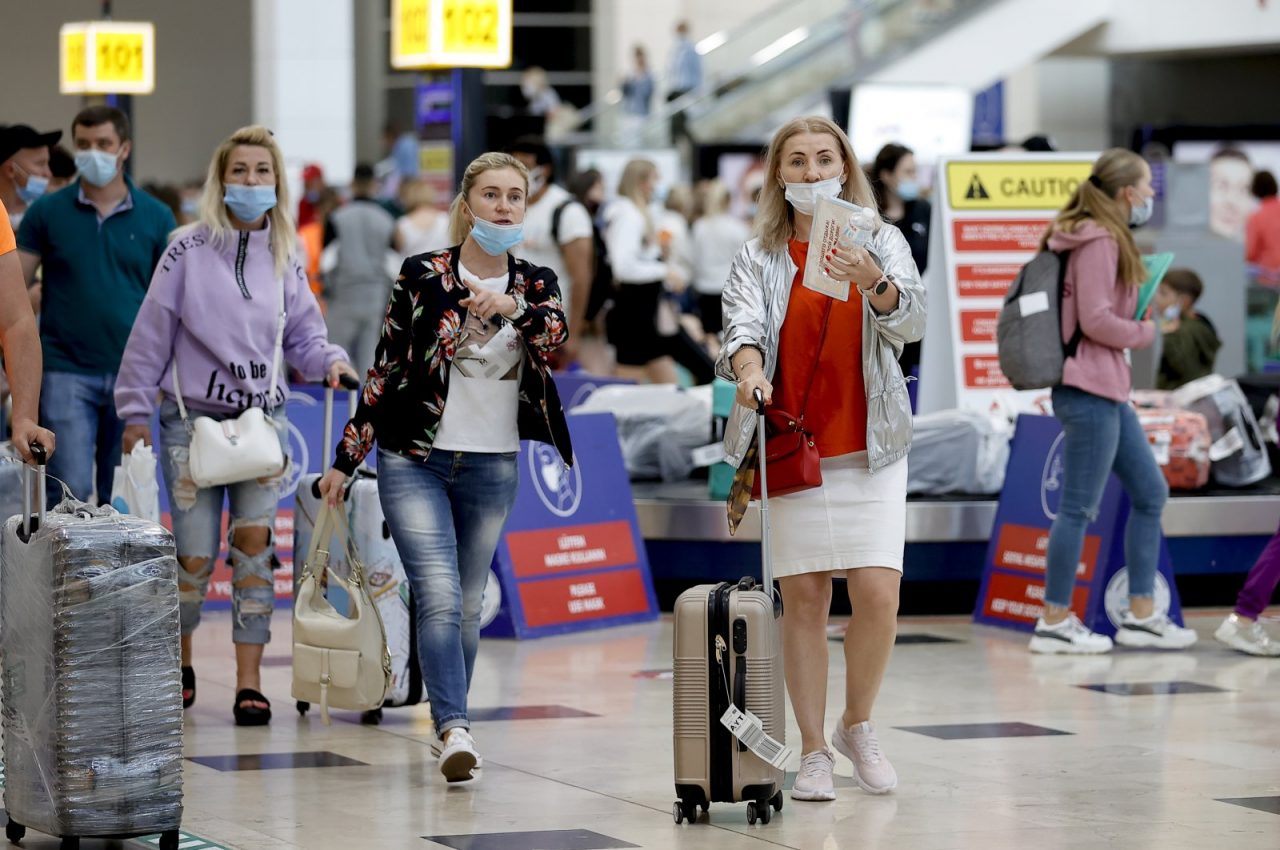
Thousands of Russian tourists began arriving in Turkey on Tuesday, boosting hopes for its tourism sector after a two-month suspension in flights imposed by Moscow due to concerns about a surge in COVID-19 cases in April.
Turkey’s tourism prospects have been revived by a sharp fall in daily coronavirus cases to around 5,000 from a peak of more than 60,000 two months ago, as well as an acceleration in vaccinations to more than 1 million a day.
The first plane arrived in the southern resort city of Antalya from Moscow around dawn, carrying 132 passengers.
The tourists got off the plane, passed through thermal cameras and entered the airport before they were transported to their hotels.
Some 12,000 Russians were expected to arrive on 44 planes in the Mediterranean tourist hub of Antalya on Tuesday, Anadolu Agency (AA) said.
Oleg Uvanov, one of the passengers, said he is on holiday with a friend who lives in Antalya.
Uvanov expressed pleasure for having arrived in Turkey after the lifting of the restrictions and added, “I want to get rid of the tiredness of the whole year, have a nice holiday and return (to Russia).”
Alexandra Donskaya, another tourist, also said that they were looking forward to a holiday and immediately bought their plane tickets when the restrictions were lifted.
The Russian tourist underlined that they love Antalya and Turkey and that she came with her family and wanted to have a nice holiday in a warm city.
Viktorina Zeiena, another passenger, said she is very happy to be in Turkey.
Up to 3 million Russians to arrive
The head of the Association of Tour Operators of Russia (ATOR), Maya Lomidze, said as many as 3 million Russian tourists could arrive by the end of September.
“Maintaining booking and price dynamics, as well as the absence of additional restrictions on coronavirus, the flow of tourists from Russia to Turkey (including Antalya, resorts in the Aegean and Istanbul) could be about 3 million people from June 22 to the end of September,” Lomidze was cited as saying by Sputnik.
She said this figure includes passengers who were unable to travel between April and June.
The “high season” could continue through October in case of appropriate weather and price conditions, Lomidze noted.
“The 2021 summer season will be better for Turkey than last year in terms of Russian tourist flow,” she said.
“The season started in June, not August. The geography of the flight has been expanded. In 2020, flights to Turkey began with seven cities, before the list was expanded to 21 cities. This year, there is permission to fly from 32 Russian cities to Turkey.”
The ATOR head also said many Russian tourists were seeking to switch their domestic tours with a trip to Turkey.
“They are changing Russian resorts, there are demands regarding this, but it is difficult to specify numbers yet,” Lomidze said.
She confirmed that 44 flights were coming to Antalya on Tuesday, bringing in around 12,200 tourists.
Some 2.13 million Russians visited Turkey last year, the highest level of any country but down from 7 million in 2019.
Russia halted most flights to Turkey on April 15 and said last week they would resume on June 22.
Booking boom
Mehmet Işler, the deputy chairperson of the Turkey Hoteliers Federation (TÜROFED), stressed the immediate effect of the flights from Russia.
“There is a massive demand for the Turkish coast. Our air traffic is up 30% from day one,” Işler noted, saying they expect around 3 million Russian tourists this year.
“We forecast about 3 million tourists from Russia and about 6 million from its neighbouring states,” he added.
“There is a booking boom. We expect this to increase even more in the coming days.”
“In the last two weeks, we are seeing better figures and better trends in daily reservations. Russian tourists are very keen to come to Turkey,” TUI Fun&Sun Hotels CEO Volkan Şimşek told an online tourism meeting on Monday evening.
“Similarly, daily reservations that we are getting from the German market are encouraging. The Russian market is going well, the German market is going well,” he said, with Germans expected to arrive from the start of July.
The number of German visitors fell to 1.1 million last year, from more than 5 million in 2019.
Tourism revenues dove by two-thirds to $12 billion (TL 104.35 billion) last year and made a weak start in 2021 as COVID-19 restrictions continued to hit an industry that usually accounts for up to 12% of the economy and is key to curbing the current account deficit.
Şimşek forecasts that the market for British tourists will open after mid-July and that the tourism season will extend to the end of November, but that a full recovery would take longer.
“I don’t think it will be possible to make up for the losses of the last two years in the next six months. It will only be possible to do so when everything returns to normal in 2023.”
Due to lower expectations, the percentage of hotels open this year should reach around 90% by July, compared with 50% that opened last year.
“For the month of July, we are planning 75 additional flights. We’re very happy with the developments as a company,” said Turkish-German joint carrier SunExpress CEO Max Kownatzki.
Fraport TAV Antalya Airport General Manager Bilgihan Yılmaz said its passenger traffic will double and may triple this year compared to 2020.
Russia’s flagship airline Aeroflot also reported high demand for the Turkish resort cities.
“Currently, there is a great interest in the cities of Antalya, Bodrum and Dalaman in Turkey,” the company said in a statement.
Article Source

previous Spain to follow France and the Netherlands, in Lifting Outdoor Masks Rule
Next few cups of coffee a day cuts risk of deadly liver disease: study.
The Mediterranean Observer is a news portal dedicated to travel tourism, and hospitality in the Mediterranean region. This portal is managed by the Mediterranean Tourism Foundation, based in the Mediterranean country of Malta.

Privacy Overview
Stay up to date with notifications from The Independent
Notifications can be managed in browser preferences.
UK Edition Change
- UK Politics
- News Videos
- Paris 2024 Olympics
- Rugby Union
- Sport Videos
- John Rentoul
- Mary Dejevsky
- Andrew Grice
- Sean O’Grady
- Photography
- Theatre & Dance
- Culture Videos
- Food & Drink
- Health & Families
- Royal Family
- Electric Vehicles
- Car Insurance deals
- Lifestyle Videos
- UK Hotel Reviews
- News & Advice
- Simon Calder
- Australia & New Zealand
- South America
- C. America & Caribbean
- Middle East
- Politics Explained
- News Analysis
- Today’s Edition
- Home & Garden
- Broadband deals
- Fashion & Beauty
- Travel & Outdoors
- Sports & Fitness
- Sustainable Living
- Climate Videos
- Solar Panels
- Behind The Headlines
- On The Ground
- Decomplicated
- You Ask The Questions
- Binge Watch
- Travel Smart
- Watch on your TV
- Crosswords & Puzzles
- Most Commented
- Newsletters
- Ask Me Anything
- Virtual Events
- Betting Sites
- Online Casinos
- Wine Offers
Thank you for registering
Please refresh the page or navigate to another page on the site to be automatically logged in Please refresh your browser to be logged in
Live updates l Turkey plans for Russian tourists despite war
Turkey’s president says the war in ukraine shouldn’t negatively affect the tourism season, article bookmarked.
Find your bookmarks in your Independent Premium section, under my profile

For free real time breaking news alerts sent straight to your inbox sign up to our breaking news emails
Sign up to our free breaking news emails, thanks for signing up to the breaking news email.
ISTANBUL — Turkey’s president says the war in Ukraine shouldn’t negatively affect the tourism season.
After prayers marking the beginning of the Muslim holiday of Eid al-Fitr, President Recep Tayyip Erdogan said that Russian President Vladimir Putin is “very sensitive" about Turkey 's need for tourism revenue and has already pledged to give his support.
Turkey suffers from skyrocketing inflation and needs tourists’ foreign currencies. Erdogan added Saudi tourists would also be arriving following his visit to Saudi Arabia last week.
In an interview with Greek state broadcaster ERT, Ukraine's President Volodymyr Zelenskyy said Russian tourism brought revenue to neighboring Greece and Turkey and called this “blood money.” Zelenskyy pointed to a double standard where Turkey acted as a meditator between Ukraine and Russia while preparing destinations for Russian tourists.
Erdogan said he’ll speak with Russian President Vladimir Putin this week to discuss speeding up evacuations from the besieged Ukrainian city of Mariupol and to find a way for grain exports from Ukraine and Russia.
KEY DEVELOPMENTS IN THE RUSSIA-UKRAINE WAR:
— Evacuation of civilians from Ukrainian steel plant begins
— Pelosi, in surprise Kyiv trip, vows unbending US support
— Jill Biden to meet Ukrainian refugees in Romania, Slovakia
Follow all AP stories on Russia’s war on Ukraine at https://apnews.com/hub/russia-ukraine
OTHER DEVELOPMENTS:
LVIV, Ukraine — The British military believes more than a quarter of all troops Russia deployed for its war in Ukraine are now “combat ineffective.”
The comment Monday came as part of a daily briefing on Twitter the British Defense Ministry has offered about the ongoing war in Ukraine. The British military believes Russia committed over 120 so-called “battalion tactical groups” into the war since February, which represents 65% of all of Moscow’s combat strength.
The ministry said, “It is likely that more than a quarter of these units have now been rendered combat ineffective.”
Combat ineffective is a term that refers to a military’s ability to wage war. Losing soldiers to wounds and death, as well as having equipment damaged or destroyed, affects that.
The British military said that some of Russia’s most elite forces, like the VDV Airborne, “have suffered the highest levels of attrition.”
It added: “It will probably take years for Russia to reconstitute these forces.”
KYIV, Ukraine — Svyatoslav Palamar, deputy commander of the Azov Regiment that is helping defend the last section of Mariupol not occupied by the Russians, said he was glad evacuations had begun.
Palamar hoped the evacuations from the Azovstal steel mill continue until everyone in the plant, civilians and soldiers, has gotten out. It’s been difficult even to reach some of the wounded inside the plant, he told The Associated Press in an interview from Mariupol on Sunday.
“There’s rubble. We have no special equipment. It's hard for soldiers to pick up slabs weighing tons only with their arms,” he said.
The Azovstal plant is strewn with mines, rockets, artillery shells and unexploded cluster ordnance, he said.
He said the presence of children and civilians makes it harder to fight, and there are many injured people in the plant. There’s not enough water, he said, and the air smells of decomposing bodies.
The fighters in the plant will continue to resist until they receive an order not to, Palamar said.
An explosive device damaged a railway bridge Sunday in the Kursk region of Russia, which borders Ukraine, and a criminal investigation has been started. The region’s government reported the blast in a post on Telegram.
Recent weeks have seen a number of fires and explosions in Russian regions near the border, including Kursk. An ammunition depot in the Belgorod region burned after explosions were heard, and authorities in the Voronezh region said an air defense system shot down a drone. An oil storage facility in Bryansk was engulfed by fire a week ago.
The explosion Sunday caused a partial collapse of the bridge near the village of Konopelka, on the Sudzha-Sosnovy Bor railway, the report from Kursk said.
“It was a sabotage, a criminal case has been opened,” said the region’s governor, Roman Starovoit, according to the Russian News Agency TASS. He said there were no casualties, and no effect on the movement of trains.
KYIV, Ukraine — Four civilians were reported killed and 11 more were injured by Russian shelling in the Donetsk region on Sunday, the Ukrainian regional governor said that evening.
The deaths and seven of the injuries were in the northern city of Lyman, governor Pavlo Kyrylenko wrote in a Telegram post. One person also died in the city of Bakhmut from injuries received in the Luhansk region, he said.
In the same post, Kyrylenko said that it was impossible to determine the number of victims in the bombed-out port city of Mariupol and the town of Volnovakha, which is controlled by pro-Kremlin separatists.
Subscribe to Independent Premium to bookmark this article
Want to bookmark your favourite articles and stories to read or reference later? Start your Independent Premium subscription today.
New to The Independent?
Or if you would prefer:
Want an ad-free experience?
Hi {{indy.fullName}}
- My Independent Premium
- Account details
- Help centre
Russian tourists seek new destinations as Europe shuts its doors over Ukraine war
The EU has imposed restrictions on Russians travelling to Europe following the invasion of Ukraine, with some countries – notably Estonia, Latvia, Lithuania, Finland, Poland and the Czech Republic – imposing an outright ban. The constraints have opened up new markets around the world for Russia’s billion-dollar tourism industry.
Issued on: 23/05/2023 - 18:02
Known for its combination of tropical beaches, lush rice paddies and volcanic mountains, Bali is a renowned tourist haven that attracts visitors from all over the world. But last year the Indian Ocean island began to see an increase in a certain kind of traveller: some 58,000 Russians had travelled to Bali by the end of the year. In January 2023 alone, visitor numbers from Russia jumped to 22,500 , according to Indonesian government data, making Russians the second-largest visitor group after Australians.
In another tourist hotspot on the opposite side of the world, the figures tell a different story. So far this year, “ Paris had 95.8% fewer Russian tourists arriving by air between January and May [compared with 2019],” said a spokesperson from the Paris tourist board. In the summer months, Russian arrivals in the French capital – one of the most visited cities in Europe – are expected to increase by less than 1 percent.
Since the full-scale invasion of Ukraine in February 2022 , it has become much harder for Russians to travel to popular holiday destinations in the European Union. Getting travel visas approved is more expensive and less straightforward , Russian air carriers have been banned from flying over or into the EU, and Russian oligarchs can no longer land their jets in some places.
There is also the prospect of a hostile welcome for Russian tourists; a little more than a year since the invasion of Ukraine, the public perception of Russia throughout EU countries is largely that of “ an adversary ”, according to a multi-nation poll conducted in January.
Yet millions of Russians are still traveling abroad. Some 22.5 million overseas trips were taken by Russian tourists in 2022, up from 19.2 million in 2021, with Turkey the leading destination.
And Russian holidaymakers are now beating a path to non-Western destinations in record numbers instead of Europe.
Changing destinations
Among those nations that have seen the biggest boom in Russian visitors are Thailand, the UAE, Turkey, the Maldives and Egypt.
Thailand, especially, is poised to “benefit significantly from the EU’s ban on Russian travel as the market is forced to change its preferred destinations”, according to a report from business intelligence provider GlobalData.
Russia ranked 14th in international tourism with expenditures at around $11.4 billion in 2021, according to Statista.
And countries around the world are keen to claim a share of that market. Sri Lanka, Morocco and Thailand plan to open direct flight paths with Russia to facilitate travel while India, Myanmar and Oman recently held talks with Russia to discuss increasing tourism.
Iran signed an agreement with Russia on Friday to boost mutual tourism cooperation, just days after Cuba signed a tourism development deal aiming to increase the number of Russian visitors to up to 500,000 a year.
For some countries, boosting Russian tourism is a way to help balance economic ties with Russia. Turkey is one of the world’s largest consumers of Russian energy, and its tourism industry is largely reliant on Russian holidaymakers. Its tourism sector has remained largely unaffected by war in Ukraine. It “did not impose sanctions on Russia, so it has become the No. 1 destination for Russian tourists”, says Faruk Balli, professor at the School of Economics and Finance at Massey University in New Zealand .
But in Cyprus and Greece, a lack of Russian tourists – who typically represent a large percentage of overall visitors – has affected the economy and prompted a rethink of tourism models.

Luring tourists despite sanctions
Some 4.6 million Russians visited Turkey in 2022, more than any other foreign country. But it is not only a destination in its own right – as Russians can no longer fly directly to the EU, Istanbul has emerged as a key layover for holidaymakers and business travellers en route to Europe.
Although fewer Russian travellers are visiting EU countries, the impact is not being felt too keenly in Paris. “Russian visitors typically represent one percent of all tourists,” a spokesperson for the Paris tourist office said.
Larger losses may be felt in Russia itself. The number of foreign visitors to Russia fell by 96.1% in 2022 compared with figures from before the Covid pandemic in 2019, according to the Association of Tour Operators of Russia.
Since the full-scale invasion of Ukraine, demand for travel to Russia has fallen among both EU and US tourists. Western sanctions have also complicated travel to Russia through flight restrictions and the impossibility of using Visa and Mastercards issued by foreign banks.
The Russian government is promoting domestic tourism to revitalise the sector, while also stepping up efforts to court international visitors. Plans are under way to coordinate the Mir Russian payment system with the Indian equivalent RuPay and to waive Russian visa requirements for visitors from some Arab and Latin American countries.
The return of Chinese tour groups in February 2023, after pandemic travel restrictions were lifted, is also being touted as a sign that Russia remains a thriving tourist destination. Russian state media has reported that the numbers of Chinese visitors to Russia could return to pre-pandemic levels within three years.
Daily newsletter Receive essential international news every morning
Take international news everywhere with you! Download the France 24 app
- European Union
The content you requested does not exist or is not available anymore.

KLM Air Cargo transports three koalas and two lions in the same week
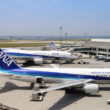
A remarkable record–no lost bags at Kansai Airport after 29 years of operations

Japan Airlines launches program to turn cooking oil into sustainable aviation fuel
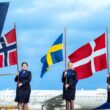
SAS to leave Star Alliance for SkyTeam alongside Air France-KLM
- ZeroAvia hydrogen-powered aircraft
- zero-emissions
- Zero emission
- Yeti Airlines
Turkey to launch new airline dedicated to Russian tourists
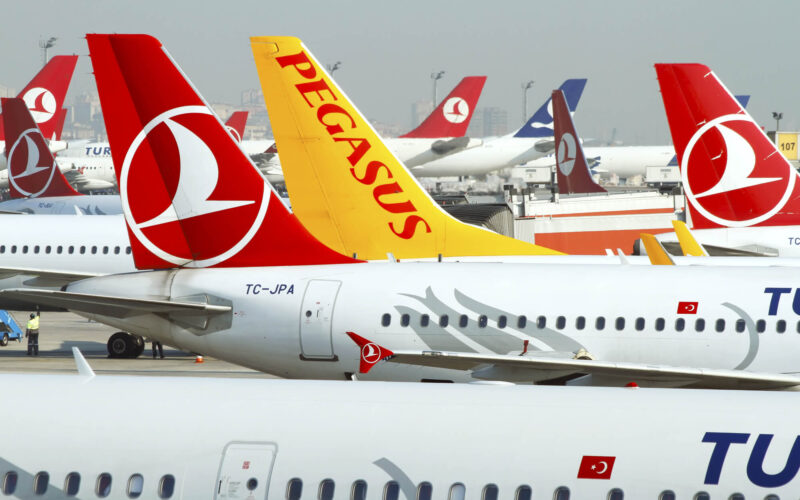
Turkish authorities are scrambling to protect one of their most critical industries, as its tourism sector continues to suffer as a result of the war in Ukraine.
Turkey is one of the favorite destinations of Russian tourists. In 2022, the Association of Turkish Travel Agencies (TURSAB) had expected as many as 7 million travelers from Russia, reaching the pre-pandemic levels as international restrictions were progressively lifted. Similarly, around 2 million holidaymakers from Ukraine were also forecasted to visit the country.
Visitors from Ukraine and Russia made up over a quarter of all tourists who arrived in Turkey in 2021.
With the eruption of the war in Ukraine, however, this optimistic forecast had to be revised. International sanctions imposed on Russia meant that thousands of bookings were canceled.
The Turkish Ministry of Culture and Tourism, the Ministry of Transport and Infrastructure, and the Ministry of Finance are considering several measures to cope with the international sanctions and the collapse of the ruble that disrupted the holiday plans of many Russian tourists, according to the Turkish daily Sabah .
An agreement was reached with Turkish Airlines and Pegasus Airlines under which they committed to respectively provide 1.5 million and 0.5 million seats to Russian passengers. In addition, the Turkish authorities are considering the creation of a new charter airline based in Antalya dedicated to Russian tourism, which could add a further 1 million seats.
To support the influx of passengers, $300 million in state-guaranteed loans would be provided to Turkish tour operators established in Russia, such as Anex, Pegas, and Coral.
- Pegasus Airlines
- Turkish Airlines
Sign Up for Our Newsletters
Related posts.

- Sustainability
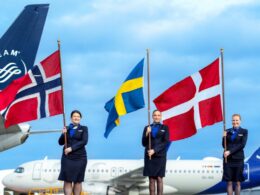
Lufthansa Boeing 747-8 makes heavy landing in Los Angeles: video
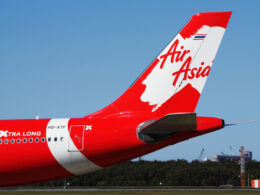
AirAsia X reveals further plans regarding acquisition of AirAsia airline group
Stay updated on aviation and aerospace - subscribe to our newsletter!
- Bahasa Indonesia
- Slovenščina
- Science & Tech
- Russian Kitchen
Is it possible to visit Russia as a tourist in 2023?
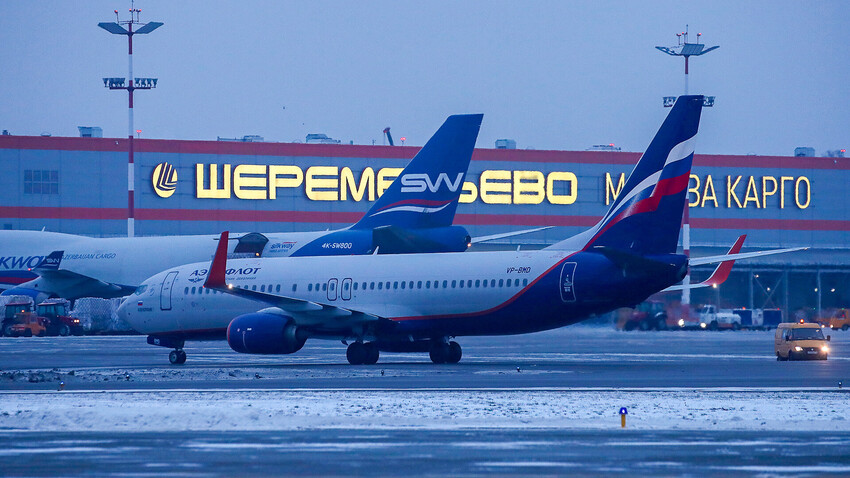
Yes, traveling to Russia as a tourist in 2023 is possible. Here’s what to look out for if you’re preparing for your dream trip.
Visa requirements
First things first, it is worth checking if you need a visa to cross the Russian border. In 2023, citizens of some 65 countries can visit Russia without a visa. This includes most of the post-Soviet states like Azerbaijan, Armenia, Belarus, Kazakhstan, Kyrgyzstan, Moldova, Tajikistan, Uzbekistan, as well as Ukraine.
Additionally, citizens of some countries in South and Central America – including Argentina, Brazil, Bolivia, Chile, Colombia, Nicaragua, Paraguay, Panama, Peru, Venezuela, Guatemala, Honduras, Costa Rica, El Salvador, Uruguay, Ecuador – do not need a visa to travel to Russia.
Citizens of Israel, South Africa, Cuba, Montenegro, Thailand, South Korea, United Arab Emirates, Qatar, Andorra, Serbia, Bosnia and Herzegovina, North Macedonia, Mongolia, Botswana enjoy visa-free regime with Russia, too.
For the full list of countries, click here .

* Data for the infographics is from November 2022 and was obtained from the Russian consular information website.
* The status of a particular country is subject to change. We advise additionally researching the relevant information in each particular case before booking any trip to Russia.
* Visa waivers may apply for holders of diplomatic or military service passports, select businessmen, air crew members, members of a ship or train crew, professional truck drivers, organized tourist groups and people who have official permission to live in some border regions.
Is it safe to travel to Russia right now?
Russia as a travel destination received a fair share of negative PR from various sources in early 2022.
Some official travel accounts run by governments of countries like the U.S. , Australia , Great Britain and others advise their citizens to abstain from non-essential travel to the country.
That said, it is always advisable to evaluate safety risks when traveling to any foreign country. Traveling to Russia is no exception. However, Moscow, St. Petersburg and other major Russian cities have been widely regarded as being safe , especially in comparison to other popular tourist destinations.
Little has changed in major Russian cities from the point of view of tourists or local residents. Consequently, the most extreme and vocal concerns over security may be disregarded as being too alarmist.
That said, logistics pose the greatest challenge for tourists traveling to Russia in 2023. A number of countries closed their national airspace for Russian air companies resulting in more complicated logistics for tourists who intend to visit Russia in 2023.
However, specific changes depend on a particular country from where a tourist departs. In some cases, direct flight routes remain intact. For example, nothing has changed for tourists from China, India, Turkey, Middle Eastern countries and the majority of post-Soviet states. They can book direct flights to Russia’s main airports.
Tourists departing from European capitals will have to book connecting flights via Turkey or countries in the Middle East. This makes tickets more expensive and flights longer. However, it is still possible to travel to Russia from virtually any country in the world.
It should be noted that every country has its own nuances that must be taken into account beforehand. For example, the Indian Embassy in Russia advises Indian nationals against traveling to Russia via third countries. According to the embassy website, Indian travelers should choose only direct flights from Delhi to Moscow, otherwise they risk being denied entry into Russia.
In another instance, the British government prohibited its citizens from purchasing tickets on Russian airlines that were under sanctions. Nonetheless, the British authorities made an exception for those journeys originating in or within Russia: in this case, British nationals may purchase tickets from Russian companies without breaching UK sanctions.
Covid restrictions, vaccination status & quarantine
In 2022, Russian authorities canceled Covid-related restrictions for Russian citizens and foreign tourists, alike.
In 2023, foreign nationals no longer need to provide results of a negative PCR test when entering Russia by any mode of transport. Therefore, foreign travelers no longer need to take a coronavirus test in advance before departure.
Furthermore, Russian authorities lifted Covid-related restrictions that required visitors to provide a specific reason for visiting the country facilitating tourist traveling.
The only remaining Covid-related regulation is a requirement to fill in a questionnaire. Passengers – both Russian and foreign citizens – will be asked to fill out the paper version of the questionnaire on board during their flight to Russia.
Click here to find out who can travel to Russia without a visa in 2023.
Dear readers,
Our website and social media accounts are under threat of being restricted or banned, due to the current circumstances. So, to keep up with our latest content, simply do the following:
- Subscribe to our Telegram channel
- Subscribe to our weekly email newsletter
- Enable push notifications on our website
- Install a VPN service on your computer and/or phone to have access to our website, even if it is blocked in your country
If using any of Russia Beyond's content, partly or in full, always provide an active hyperlink to the original material.
to our newsletter!
Get the week's best stories straight to your inbox
- Why do some Russians look Asian?
- Who can visit Russia WITHOUT a VISA in 2023
- Was vodka invented by Russian chemist Mendeleev?
This website uses cookies. Click here to find out more.
Travel, Tourism & Hospitality
Industry-specific and extensively researched technical data (partially from exclusive partnerships). A paid subscription is required for full access.
Tourism balance over GDP in Turkey 2010-2021
Tourism balance over gross domestic product (gdp) in turkey from 2010 to 2021.
- Immediate access to 1m+ statistics
- Incl. source references
- Download as PNG, PDF, XLS, PPT
Additional Information
Show sources information Show publisher information Use Ask Statista Research Service
October 2022
2010 to 2021
Tourism balance refers to inbound minus outbound tourism expenditure.
Other statistics on the topic
Leisure Travel
International visitors in Israel 2016-2022
Number of departures abroad of Israeli citizens from Israel 2014-2022
Number of visitors to the U.S. from Israel 2011-2022
Number of tourists from the United States in Israel 2018-2022
To download this statistic in XLS format you need a Statista Account
To download this statistic in PNG format you need a Statista Account
To download this statistic in PDF format you need a Statista Account
To download this statistic in PPT format you need a Statista Account
As a Premium user you get access to the detailed source references and background information about this statistic.
As a Premium user you get access to background information and details about the release of this statistic.
As soon as this statistic is updated, you will immediately be notified via e-mail.
… to incorporate the statistic into your presentation at any time.
You need at least a Starter Account to use this feature.
- Immediate access to statistics, forecasts & reports
- Usage and publication rights
- Download in various formats
You only have access to basic statistics. This statistic is not included in your account.
- Instant access to 1m statistics
- Download in XLS, PDF & PNG format
- Detailed references
Business Solutions including all features.
Other statistics that may interest you
- Tourism openness over GDP in Estonia 2010-2021
- Tourism balance over GDP Indonesia 2014-2020
- Tourism balance over GDP in Poland 2010-2021
- Tourism openness over GDP Indonesia 2011-2020
- Tourism balance over GDP in Bulgaria 2010-2021
- Tourism openness over GDP in Bulgaria 2010-2021
- Tourism balance over GDP in Latvia 2012-2020
- Tourism openness over GDP in Latvia 2010-2021
- Tourism balance over GDP in Croatia 2010-2021
- Tourism balance over GDP in Russia 2010-2020
- Inbound tourist expenditure in Turkey Q1 2017-Q4 2021
- Distribution of travel and tourism expenditure in Turkey 2019-2022, by tourist type
- Travel and tourism contribution to employment in Turkey 2017, by type
- Most visited destinations by international tourists in Turkey 2019-2022
- Tourism income in Turkey 2019-2022, by type of expenditure
- Average number of domestic overnight stays in Turkey 2009-2022
- Travel and tourism's total contribution to GDP in Turkey 2019-2023
- Distribution of travel and tourism expenditure in Turkey 2019-2022, by type
- Employment in the tourism industry in Turkey 2019, by sector
- Travel and tourism contribution to GDP in Turkey 2017, by type
- Countries with the highest number of inbound tourist arrivals worldwide 2019-2022
- Countries with the highest outbound tourism expenditure worldwide 2019-2022
- Change in number of visitors from Mexico to the U.S. 2018-2024
- Annual revenue of China Tourism Group Duty Free 2013-2023
- Foreign exchange earnings from tourism in India 2000-2022
- Number of international tourist arrivals in India 2010-2021
- Leading countries in the MEA in the Travel & Tourism Competitiveness Index 2018
- International tourism receipts of India 2011-2022
- Tourism openness over GDP in Croatia 2010-2021
- Tourism openness over GDP in Austria 2007-2019
- Mexico: share of paid jobs in tourism by service type 2017
- Tourism balance over GDP in Azerbaijan 2007-2019
- Tourism openness over GDP in Albania 2007-2019
- Tourism openness over GDP in Russia 2010-2020
- Tourism openness over GDP in Germany 2007-2019
- Tourism balance over GDP in Estonia 2010-2021
- Tourism openness over GDP in Ireland 2007-2019
- Tourism openness over GDP in Azerbaijan 2007-2019
- Inbound visitor arrivals in Turkey 2008-2023
- Outbound tourist expenditure from Turkey Q1 2017-Q4 2022
- Total tourism income in Turkey 2001-2023
- Number of inbound visitors in Turkey 2006-2023
- Domestic tourism spending in Turkey 2019-2022, by type
- Number of residents traveling abroad from Turkey 2006-2023
- Leading outbound destinations visited by residents of Turkey 2019-2023
- Travel and tourism's total contribution to employment in Turkey 2019-2023
- International overnight visitors to Istanbul 2012-2018
- International visitor spending in Istanbul 2012-2018
Other statistics that may interest you Statistics on
About the industry
- Premium Statistic Tourism openness over GDP in Estonia 2010-2021
- Premium Statistic Tourism balance over GDP Indonesia 2014-2020
- Premium Statistic Tourism balance over GDP in Poland 2010-2021
- Premium Statistic Tourism openness over GDP Indonesia 2011-2020
- Premium Statistic Tourism balance over GDP in Bulgaria 2010-2021
- Premium Statistic Tourism openness over GDP in Bulgaria 2010-2021
- Premium Statistic Tourism balance over GDP in Latvia 2012-2020
- Premium Statistic Tourism openness over GDP in Latvia 2010-2021
- Premium Statistic Tourism balance over GDP in Croatia 2010-2021
- Premium Statistic Tourism balance over GDP in Russia 2010-2020
About the region
- Premium Statistic Inbound tourist expenditure in Turkey Q1 2017-Q4 2021
- Basic Statistic Distribution of travel and tourism expenditure in Turkey 2019-2022, by tourist type
- Basic Statistic Travel and tourism contribution to employment in Turkey 2017, by type
- Premium Statistic Most visited destinations by international tourists in Turkey 2019-2022
- Premium Statistic Tourism income in Turkey 2019-2022, by type of expenditure
- Premium Statistic Average number of domestic overnight stays in Turkey 2009-2022
- Basic Statistic Travel and tourism's total contribution to GDP in Turkey 2019-2023
- Basic Statistic Distribution of travel and tourism expenditure in Turkey 2019-2022, by type
- Premium Statistic Employment in the tourism industry in Turkey 2019, by sector
- Basic Statistic Travel and tourism contribution to GDP in Turkey 2017, by type
Selected statistics
- Premium Statistic Countries with the highest number of inbound tourist arrivals worldwide 2019-2022
- Premium Statistic Countries with the highest outbound tourism expenditure worldwide 2019-2022
- Premium Statistic Change in number of visitors from Mexico to the U.S. 2018-2024
- Premium Statistic Annual revenue of China Tourism Group Duty Free 2013-2023
- Basic Statistic Foreign exchange earnings from tourism in India 2000-2022
- Basic Statistic Number of international tourist arrivals in India 2010-2021
- Premium Statistic Leading countries in the MEA in the Travel & Tourism Competitiveness Index 2018
- Basic Statistic International tourism receipts of India 2011-2022
Other regions
- Premium Statistic Tourism openness over GDP in Croatia 2010-2021
- Premium Statistic Tourism openness over GDP in Austria 2007-2019
- Premium Statistic Mexico: share of paid jobs in tourism by service type 2017
- Premium Statistic Tourism balance over GDP in Azerbaijan 2007-2019
- Premium Statistic Tourism openness over GDP in Albania 2007-2019
- Premium Statistic Tourism openness over GDP in Russia 2010-2020
- Premium Statistic Tourism openness over GDP in Germany 2007-2019
- Premium Statistic Tourism balance over GDP in Estonia 2010-2021
- Premium Statistic Tourism openness over GDP in Ireland 2007-2019
- Premium Statistic Tourism openness over GDP in Azerbaijan 2007-2019
Related statistics
- Premium Statistic Inbound visitor arrivals in Turkey 2008-2023
- Premium Statistic Outbound tourist expenditure from Turkey Q1 2017-Q4 2022
- Premium Statistic Total tourism income in Turkey 2001-2023
- Premium Statistic Number of inbound visitors in Turkey 2006-2023
- Premium Statistic Domestic tourism spending in Turkey 2019-2022, by type
- Premium Statistic Number of residents traveling abroad from Turkey 2006-2023
- Premium Statistic Leading outbound destinations visited by residents of Turkey 2019-2023
- Basic Statistic Travel and tourism's total contribution to employment in Turkey 2019-2023
- Premium Statistic International overnight visitors to Istanbul 2012-2018
- Premium Statistic International visitor spending in Istanbul 2012-2018
Further related statistics
- Basic Statistic Contribution of China's travel and tourism industry to GDP 2014-2023
- Premium Statistic Passenger traffic at Dubai Airports from 2010 to 2020*
- Basic Statistic Growth of inbound spending in the U.S. using foreign visa credit cards
- Basic Statistic Importance of BRICS countries to UK tourism businesses 2011
- Basic Statistic Number of Marriott International hotels worldwide 2009-2023
- Premium Statistic Number of visitors to the U.S. from Russia 2011-2022
- Premium Statistic Number of international tourist arrivals APAC 2019, by country or region
- Premium Statistic Extended stay lodging units: total number in the U.S. 2008-2016
- Premium Statistic Music tourist spending at concerts and festivals in the United Kingdom (UK) 2012-2016
- Premium Statistic Business class air fares used by corporate clients - growth forecast 2011-2012
Further Content: You might find this interesting as well
- Contribution of China's travel and tourism industry to GDP 2014-2023
- Passenger traffic at Dubai Airports from 2010 to 2020*
- Growth of inbound spending in the U.S. using foreign visa credit cards
- Importance of BRICS countries to UK tourism businesses 2011
- Number of Marriott International hotels worldwide 2009-2023
- Number of visitors to the U.S. from Russia 2011-2022
- Number of international tourist arrivals APAC 2019, by country or region
- Extended stay lodging units: total number in the U.S. 2008-2016
- Music tourist spending at concerts and festivals in the United Kingdom (UK) 2012-2016
- Business class air fares used by corporate clients - growth forecast 2011-2012
Tuesday, April 30, 2024 6:18 am (Paris)
'Russia could push Turkey into lasting political and military antagonism with the rest of NATO'
Marc Pierini
Former EU ambassador to Turkey
Ankara continues to position itself halfway between Russia and NATO. However, adjustments could pacify and strengthen essential ties with the Western world, argues Marc Pierini, former European Union ambassador to Turkey.
Published on April 22, 2024, at 11:00 am (Paris) Time to 3 min. Lire en français
- Share on Twitter
- Share on Messenger
- Share on Facebook
- Share by email
- Share on Linkedin
Subscribers only
H istorically, the delivery of Russian S-400 missiles to Turkey in 2019 represented a double strategic gain for Moscow. First, the presence of these missiles effectively ruled out any future delivery of US Patriot or French-Italian SAMP/T missiles. And second, the potential activation of Russian missiles led Washington, in 2020, to impose sanctions on Turkey – a cancellation of Turkey's order for 120 Lockheed Martin F-35 and F-35B stealth fighters, and an exclusion of Turkish industry from F-35 production.
From Moscow's point of view, the result is positive: The southern interface between Russia and the North Atlantic Treaty Organization (NATO) has been "cleared" of two of the most advanced air systems.
This change in military relations between Ankara and Moscow has cast doubt on the reliability of a NATO member that has long been the Atlantic Alliance's stronghold in South-East Europe. Ankara explained that the collapse of the Soviet Union has changed the game, but Turkey is keen to retain its role within NATO. It is also actively pursuing its goal of strategic autonomy and arms exports.
Since February 2022, these doubts have intensified with Turkey's refusal to join the sanctions against Russia and the significant development of energy and financial relations with Moscow (discounted gas payable in rubles, advance on royalties linked to the Akkuyu nuclear power plant). These factors played a role in the Turkish presidential election in 2023, and oil transactions enabled Russia to circumvent certain Western sanctions.
The Russian war in Ukraine could escalate considerably, and new flashpoints could involve Turkey due to their geographical proximity. For example, the need to step up the protection of civilian cargo ships used for Ukrainian exports and imports or a potential weakening of Moldova by Russia. As a result, Turkey's strategic ambiguity would become more visible: it would either have to clearly associate itself with NATO operations in Eastern Europe, or openly abstain.
Numerous pressure tactics
Russia's attitude toward Turkey will be closely watched. As has been the case since 2019, Moscow could continue to push Ankara toward lasting political and military antagonism with the rest of NATO, in line with Hungary's desire to differentiate itself from the rest of the European Union. Moscow's means of pressure on Ankara are numerous: gas supplies (prices, volumes, profitable transit to Southeast Europe); crude oil processing; new offers of military equipment; opposition to Turkish-Ukrainian cooperation on military aviation; acceptance or rejection of President Recep Tayyip Erdogan's offers of mediation; and the authorization or prohibition of Turkish operations against Kurdish forces in northern Syria.
You have 53.53% of this article left to read. The rest is for subscribers only.
Lecture du Monde en cours sur un autre appareil.
Vous pouvez lire Le Monde sur un seul appareil à la fois
Ce message s’affichera sur l’autre appareil.
Parce qu’une autre personne (ou vous) est en train de lire Le Monde avec ce compte sur un autre appareil.
Vous ne pouvez lire Le Monde que sur un seul appareil à la fois (ordinateur, téléphone ou tablette).
Comment ne plus voir ce message ?
En cliquant sur « Continuer à lire ici » et en vous assurant que vous êtes la seule personne à consulter Le Monde avec ce compte.
Que se passera-t-il si vous continuez à lire ici ?
Ce message s’affichera sur l’autre appareil. Ce dernier restera connecté avec ce compte.
Y a-t-il d’autres limites ?
Non. Vous pouvez vous connecter avec votre compte sur autant d’appareils que vous le souhaitez, mais en les utilisant à des moments différents.
Vous ignorez qui est l’autre personne ?
Nous vous conseillons de modifier votre mot de passe .
Lecture restreinte
Votre abonnement n’autorise pas la lecture de cet article
Pour plus d’informations, merci de contacter notre service commercial.
Turkey's Erdogan postpones tentative White House visit, sources say
- Medium Text
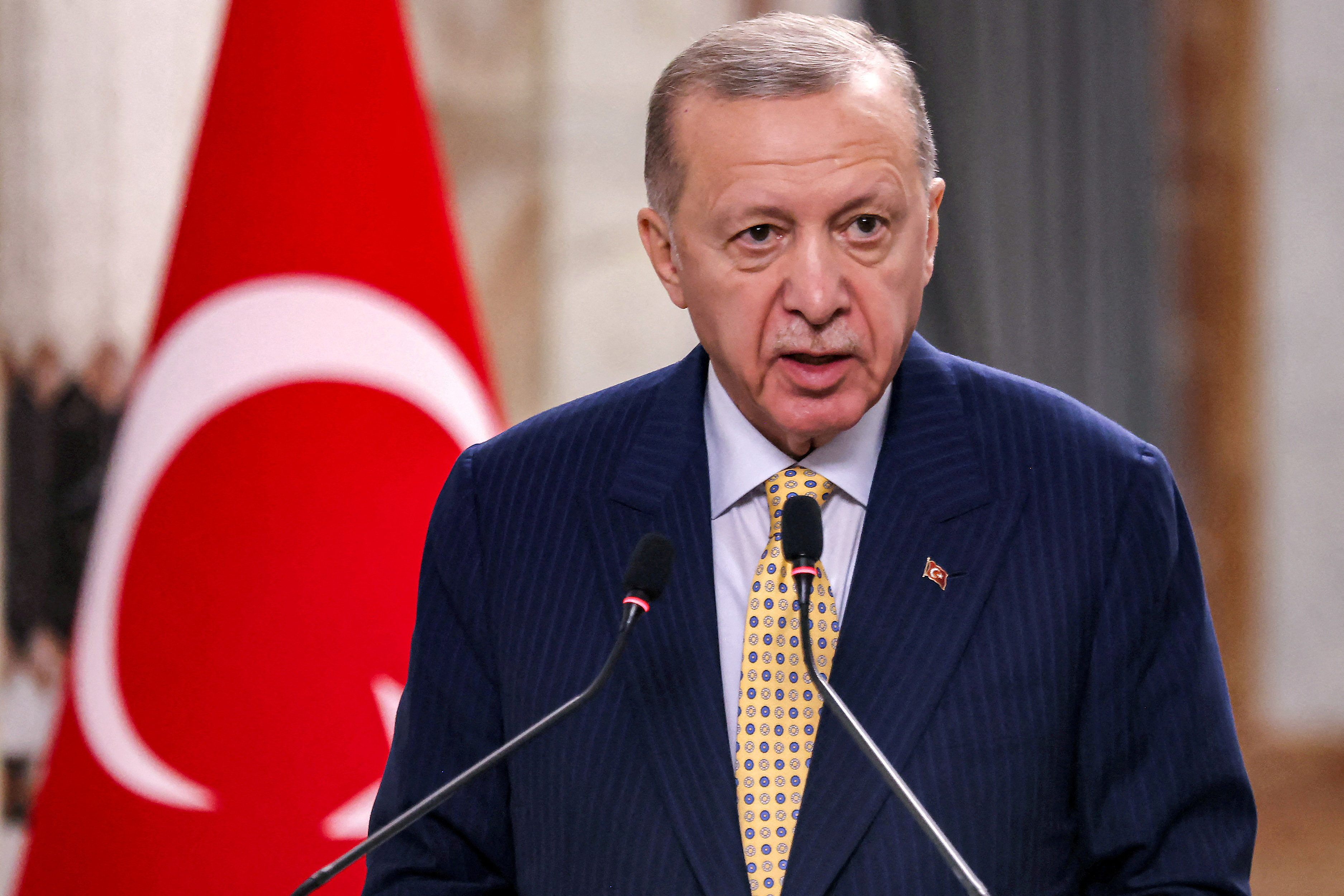
Sign up here.
Reporting by Steve Holland and Humeyra Pamuk in Washington and Jonathan Spicer in Ankara; additional reporting by Jarrett Renshaw and Paul Grant; writing by Susan Heavey; Editing by Doina Chiacu and Alistair Bell, Kirsten Donovan
Our Standards: The Thomson Reuters Trust Principles. New Tab , opens new tab

Thomson Reuters
Turkey Bureau Chief overseeing political, economic and foreign policy coverage. Work spans the country's diplomatic balancing act, landmark elections, historic earthquakes and the mainstream media, as well as reporting on Syria, Lebanon and Ukraine. Previously covered the U.S. economy, Federal Reserve and Wall Street including award-winning work on financial-market trading and a global cyber heist.
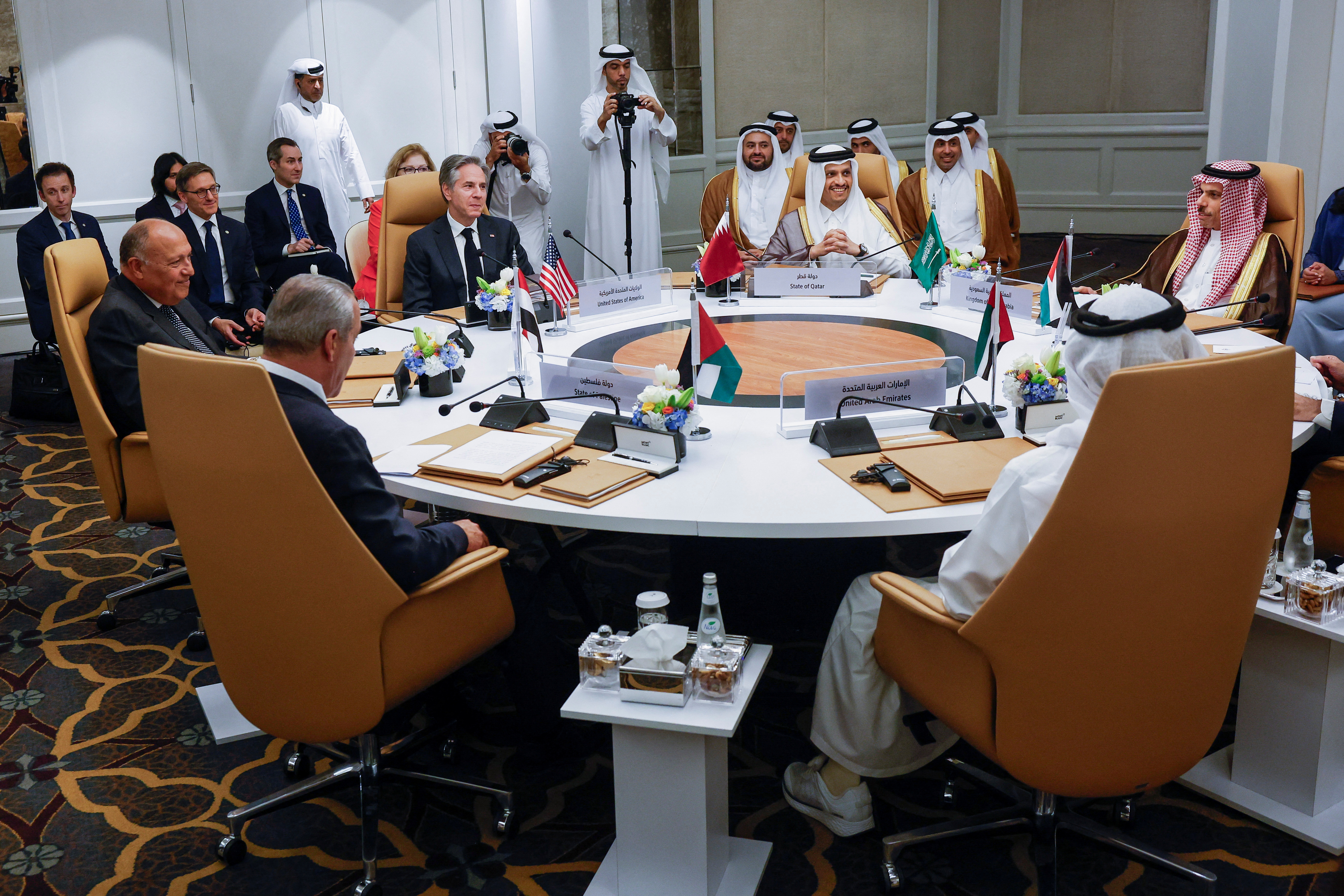
World Chevron

Four law enforcement officers killed in North Carolina, police say
Four law enforcement officers were shot to death and four others were wounded on Monday in a gun battle that erupted while they were serving a fugitive arrest warrant at a house in Charlotte, North Carolina, authorities said.

- International edition
- Australia edition
- Europe edition
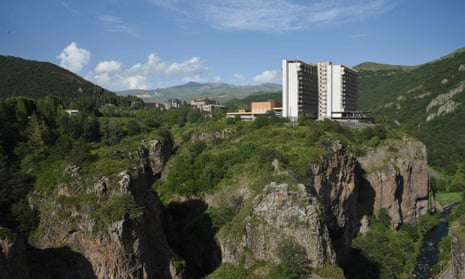
Armenia turns towards west in search of allies amid Azerbaijan tensions
Series of traumatic defeats has prompted a rethink in what was once seen as the most pro-Moscow of the ex-Soviet republics
W ith its waterfall, hot spring, orchards full of apricot blossom and a gorge through which the swollen Arpa River races, the town of Jermuk since Soviet times has been one of the most visited in Armenia. That was until just after midnight on 12 September 2022 when Azerbaijani forces surged over the border , advancing about 4 miles in a two-day push that left them in full control of the long mountain ridge overlooking the town.
“It was truly frightening. The forest was set on fire. It was like lightning coming down on us. It went on for two days. We did not know how it would end, and how to get our families out,” recalled Rubik Avakelyan, 69, sitting on a park bench.
The initial three-hour attack included mortars, heavy artillery and drones. The whole town now lives in fear of a further attack. “We did not know which way to turn, but I do not see much future here,” Avakelyan said.
Closer to the frontline, buildings and a fish farm lie abandoned, adding to the sense of foreboding and decay that contested borders can bring.
“The Azeris are fortifying their positions and we think when the snow is over they are planning something else,” said Vahagn Arsenyan, the mayor of the 9,000-strong town. “We expect a new aggression at any time, and right now and here where we are sitting in this office is a visible target for them. They have damaged us economically and psychologically. The hotel rooms were usually 90% occupied.”
Tourism income is down 60% as visitors are put off by the presence of Azerbaijan’s forces only 3 miles away. “If there is no economy, families want to leave,” Arsenyan said.
The quest for suitable allies is a constant in Armenia’s history, as testified to by a statue of a 17th-century Armenian diplomat, Israel Ori, on the outskirts of town. Ori dedicated his life to the country’s liberation from the Persian and Ottoman empires. He travelled through Europe fruitlessly in search of countries willing to help liberate Armenia , before finally arriving at the court of Peter the Great to plead: “We do not have another hope, we hope for God and your country.”
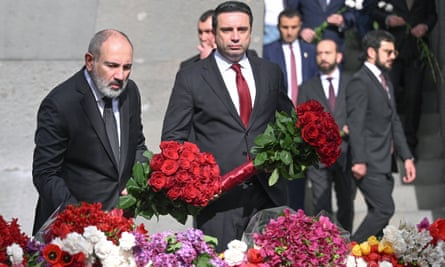
Armenia’s prime minister, Nikol Pashinyan, is caught in a similar predicament. He has invested hope in building alliances to fend off the “Turks”, as many Armenians call the Azeris. However, it is not to a distracted Russia that he has turned but to the west, a gamble for this lonely democracy in a region of authoritarianism.
It is a remarkable turnaround for a country that used to get 98% of its arms from Russia and was seen as probably the most pro-Moscow of the former Soviet republics at the time of the Soviet Union’s dissolution in 1991.
Pashinyan came to power in a velvet revolution in 2018. Faced with intractable conflicts, he did not initially seek to break the security partnership with Russia. Landlocked, with two of its four borders – with Turkey and Azerbaijan – closed, Pashinyan could hardly afford to alienate Russia in what Moscow regarded as its back yard.
But a rethink has been prompted by a series of traumatic defeats at the hands of the better trained and better armed Azerbaijan in 2020 and 2022, followed by the expulsion of more than 100,000 Armenians from the enclave of Nagorno-Karabakh in September 2023. On the latter two occasions, Russia, burdened by the war in Ukraine, failed to come to Armenia’s protection, in effect trashing security guarantees.
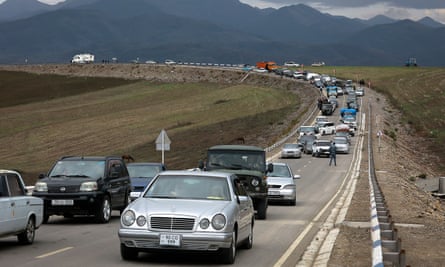
Popular anger at the perceived betrayal by Russian peacekeepers, especially among some of the expelled refugees from Nagorno-Karabakh , is intense.
Sitting in a rudimentary government-provided flat in the capital, Yerevan, Ruslan Hayrapetyan, a former police officers, said he repeatedly went to the Russian peacekeepers with carefully documented incidents of Azeri attacks on farmers, only to be told by the Russians: “Do you think we are here to die for you?”
His wife, Nina, said that as Azerbaijan pushed into the enclave after an eight-month food blockade, her family spent two days hiding from the shelling in shelters and were then told that the best that Russians could do was open a road out of their town, Martuni, to the capital, and from there they would be taken on buses through the Lachin corridor to Armenia.
She said the town administrator told them: “In 10 hours the Azeris will enter the town. You may stay, but I will remind you of the massacres of 1915. You will be tortured, raped and beheaded.”
Ethnic Armenians fled what had been their homeland for generations, in what they regarded as a piece of ethnic cleansing, and some of their captured political leaders still languish in jails in Azerbaijan. Pashinyan, in an interview with a group of British journalists, admitted he believed the refugees now scattered around Armenia would never be able to return.
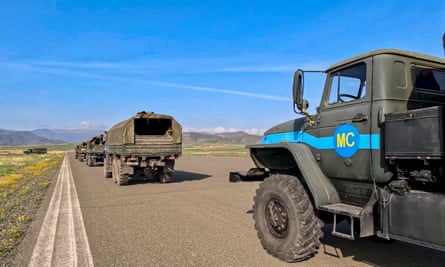
The episode caused the rupture in Armenian-Russian relations and further polarised an already divided Armenian society. Russia’s peacekeepers have this month left Nagorno-Karabakh ahead of schedule. In a sign of an ideological chasm, the speaker of the Armenian parliament this week attacked Russia’s Ukraine policy, leading to claims of Russophobia from Moscow.
National assembly members complain that Azerbaijan seems unconstrained and determined to raise more demands. “My profession, international law, is dead,” said Vladimir Vardanyan, the chair of the legal affairs committee. He warned of a new era of imperialism in which countries such as his own were squeezed.
“Each and every empire has been interested in increasing its land, and since we currently have a situation where the traditional alliances built at Potsdam [and] Yalta are no longer operating, sovereignty becomes ever more vulnerable,” he said. “It’s important we build a consensus about the future of this region because if we do not, we will have a more imperialistic world than in the 19th century.”
In his tiny office in Yerevan, Tigran Grigoryan, an articulate thinktanker, blamed the “fiasco” in Nagorno-Karabakh on the fact that the war in Ukraine had distracted and weakened Russia. He said: “Relations with Azerbaijan turned out to be more important for Russia than fulfilling its obligations to Armenia. President Ilham Aliyev [of Azerbaijan] has seen this power vacuum and the military imbalance between the two countries to make threats and extract ever more unilateral concessions.”
This month Pashinyan ceded four unoccupied border villages in the north-eastern province of Tavush back to Azerbaijani control after three decades. It was billed as the first step in the negotiated process of defining the borders between the two countries along the boundaries that existed at the time of the Soviet Union’s dissolution.
Accused by the opposition of endless capitulation, Pashinyan insisted the alternative would have been war. The deal sparked days of protests by villagers, leading to as many as 80 arrests in the capital.
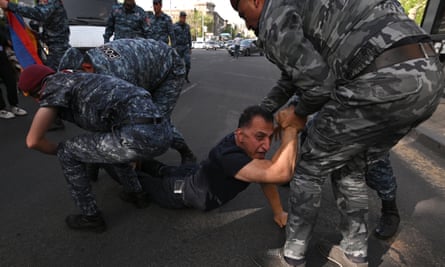
Emotions had already been running high since it was the anniversary of the Armenian genocide, a time when tens of thousands of Armenians, carrying carnations and roses, process to the monument that commemorates a genocide that not all countries, including the UK, recognise.
“Virtually everyone in Armenia has one ancestor or relative who was either killed in the genocide or forced to leave its ancestral home,” Rubinyan said.
The most visible example of the pivot has been since February 2023 the deployment of a 200-strong unarmed EU civilian monitoring mission that has already amassed more than 2,000 patrols from six bases on the Armenian side of the border. With their blue flags, Jeeps and binoculars, they observe Azerbaijani troop movements and send copious daily reports back to Brussels. The staff seem convinced they provide reassurance when tensions and disinformation flourish.
Markus Ritter, the mission’s director, defended its limited objectives. “We can calm things down. We have become a stabilising factor,” he said. “If you compare the situation before the deployment and afterwards, there is a difference.”
But in parts of southern Armenia, Russia blocks his observers from operating. Ritter admitted: “This is a country that is desperately looking for friends and allies.”
Armenia is now buying weapons from India and France, and on 5 April the EU and the US pledged to provide Armenia with €270m and $65m respectively.
The new partnership is designed to start easing Armenia’s heavy dependence on the Russian markets and energy. But it is a very modest package, prompting one Armenian diplomat to complain privately: “I fear we are being led like lambs to the slaughter.”
- Nagorno-Karabakh
Most viewed
Ukraine-Russia war latest: At least four dead in daytime missile strike on port city - as massive building on fire
It is likely to be a "very difficult summer" for Ukrainian forces in the face of increased Russian attacks, military analyst Sean Bell says. Listen to a Daily podcast on whether the UK should send troops to Ukraine as you scroll.
Monday 29 April 2024 22:48, UK
- At least four killed in daytime missile attack on Odesa
- Watch: Massive building in flames after attack
- Ukraine in for 'difficult summer' as Russia preparing 'major offensive'
- North Korea expresses 'concern' over US sending long-range missiles to Ukraine
- Explained : Why is Chasiv Yar the next target for Russia?
- Your questions answered: Will Ukraine launch another spring offensive?
- Big picture : What you need to know as a new week begins
- Listen to the Sky News Daily above and tap here to follow wherever you get your podcasts
As we reported a short time ago, the Duchess of Edinburgh has met with Volodymyr Zelenskyy in Ukraine, in what marks the first visit to the country by a member of the Royal Family since the war begin.
Sophie met the Ukrainian president and first lady Olena Zelenska and delivered a message to them on behalf of the King, Buckingham Palace said.
You can watch footage from her trip here...
Throughout the day, we've been reporting on a Russian attack on the city of Odesa in Ukraine, which has killed at least four people.
These images show a burning educational institution building, which was struck.
Airline Finnair has said it is pausing flights to Tartu in eastern Estonia for the next month, due to GPS disturbances in the area.
"Finnair will suspend its daily flights to Tartu, Estonia, from 29 April to 31 May, so that an alternative approach solution that does not require a GPS signal can be put in place at Tartu Airport," the Finnish airline said in a statement.
Finnair last week had to divert two flights back to Helsinki after GPS interference prevented the approach to Tartu airport, although a spokesperson said the company did not now where the interference came from.
However, Tallinn seems certain as where the issues are originating.
"It is a fact that Russia affects GPS devices in our region’s airspace," Estonia's foreign minister said via a spokesperson.
Margus Tsahkna added that Estonia will raise the issue of GPS interference with its neighbours, and intends to discuss it with the EU and NATO.
GPS jamming and spoofing have grown worse in eastern Europe, the Black Sea and the Middle East, all areas close to conflict zones, according to industry group OpsGroup.
More than 30 Ukrainian conscripts have died while trying to cross the border illegally to avoid mobilisation, a Ukrainian official has said.
Andriy Demchenko, spokesman for the State Border Guard Service, told Ukrinform that some men are prepared to pay "large sums" of money to groups promising to smuggle them across the border safely.
"Then they are faced with the fact that the route runs along a mountain river," he said.
Many conscripts have lost their lives after realising they didn't have the strength to swim the river, Mr Demchenko added.
"In total, since the beginning of the full-scale invasion, about 30 people have died trying to cross the border illegally," he said.
Such attempts occur "every day", he said.
For context: Ukraine has been under martial law since the Russian invasion in February 2022.
It lets draft officers call up men of a certain age to fight on the front line.
In April, Volodymyr Zelenskyy signed off a new law lowering the age of draft-eligible men from 27 to 25, in a bid to boost troop numbers in his depleted ranks.
The Duchess of Edinburgh has met with Volodymyr Zelenskyy in Ukraine, in what marks the first visit to the country by a member of the Royal Family since the war begin.
Her visit is aimed at demonstrating "solidarity with the women, men and children impacted by the war and in a continuation of her work to champion survivors of conflict-related sexual violence", the palace said.
Three women and a man have died after a Russian attack on Odesa.
A further 28 people have been injured, including two children aged five and 16. A pregnant woman has also been hurt.
This video shows the aftermath of the attack.
Debris recovered from a missile that landed in the Ukrainian region of Kharkiv on 2 January was North Korean, the Reuters news agency is reporting.
Citing a United Nations sanctions monitor, Reuters said debris recovered was from a Hwasong-11 series ballistic missile - made in North Korea.
Three sanctions monitors travelled to Ukraine earlier this month to inspect the debris - and found no evidence that the missile was made by Russia.
They "could not independently identify from where the missile was launched, nor by whom".
"Information on the trajectory provided by Ukrainian authorities indicates it was launched within the territory of the Russian Federation," they wrote in an April 25 report to the UN Security Council's North Korea sanctions committee.
"Such a location, if the missile was under control of Russian forces, would probably indicate procurement by nationals of the Russian Federation," they said, adding that this would be a violation of the arms embargo imposed on North Korea in 2006.
International leaders have long accused North Korea of supplying Russia with weapons.
Both Moscow and Pyongyang have denied the accusations, but vowed last year to deepen military relations.
The situation in Odesa is fast-moving after the city in southern Ukraine came under Russian missile attack this afternoon.
Three women and a man have died, bringing the total number of people killed to four, according to regional governor Oleg Kiper.
He said a further 28 people have been injured, including two children aged five and 16. A pregnant woman has also been hurt.
Four people are "fighting for their lives," he said in a Telegram post .
A big building housing part of the Odessa Law Academy is ablaze after the strike...
The number of people injured in Russia's missile attack on Odesa has increased.
Regional governor Oleg Kiper said he was aware of 17 injured people, of whom at least two are in a "serious condition". Separately, Odesa mayor Gennadiy Trukhanov said at least 20 people were hurt.
Emergency services continue to work at the scene, Mr Kiper said. Earlier, he reported that at least two people had been killed in the attack (see 17.46 post).
The Odesa region has been repeatedly targeted by Russia during the war.
Last month, a Russian ballistic missile attack on a residential area killed at least 20 people and wounded more than 70.
Ukrainian troops are still defending their positions on the frontline while grappling with depleted weapons supplies and increased Russian attacks.
Western support is on full display in the pictures below, with soldiers of the Ukrainian army's 25th separate airborne brigade operating a German-made Marder infantry fighting vehicle.
Be the first to get Breaking News
Install the Sky News app for free


IMAGES
VIDEO
COMMENTS
Turkey has always been a prime destination for Russians. Its warm weather and idyllic coasts, along with visa-free travel for tourism and business attracted seven million Russian visitors a year ...
Reports from earlier this year declared that Russians saved Turkey's tourism industry in 2021 after it was trying to rebound from the first year of the coronavirus pandemic. Russians ranked atop ...
Russian tourism hit by ban on Turkey holidays. While Russian tourists continue to come to Turkey, the EU is tightening rules against them after Ukraine's government urged the bloc and G7 ...
Around 4.5 million Russian and two million Ukrainian tourists descended on Turkey last year Ozan KOSE AFP. The government was hoping for a post-Covid rebound this year, with a target of almost $35 ...
Russian tourists are usually a major presence and economic boon to Turkey's coastline. But local merchants worry that they might not be arriving this summer after Russia invaded Ukraine.
Some 4.7 million Russian tourists, out of a total of 24.7 million foreign tourists, visited Turkey last year, accounting for 19% of the total tourist arrivals, followed by Germany with 12.5% and ...
Antalya is a longtime Russian tourist destination that's become a refuge for those who don't want to fight in the war. But things are getting more complicated for Russians in Turkey.
Thousands of Russian tourists began arriving in Turkey on Tuesday, boosting hopes for its tourism sector after a two-month suspension in flights imposed by Moscow due to concerns about a surge in ...
Ugur, who has many contacts in Turkey, says the tourism industry presently expects some 1.5 to 1.7 million Russian guests — roughly one-third of the 4.7 million who streamed into Turkey in 2021 ...
Tourism in Turkey: Russians stay away 06/10/2022 June 10, 2022. Turkey's tourism industry benefited greatly from Russian visitors. But times have changed.
The tourist flow from the Russian Federation to the resorts of Antalya province in January 2023 amounted to 71,752 visits (25.6% of the total Russian tourist flow to Turkey this month). Compared to January 2022, the number of trips of Russians to Antalya increased by 66%. In January, only 454 Russians (0.16% of the total Russian tourist flow ...
The tourist flow from Russia to Turkey in the first quarter of 2023 was distributed as follows: in January - 279,818 arrivals (+108.5% by January 2022), in February - 227,695 visits (+103% by February 2022), in March - 265,168 visits (+ 131.8% by March 2022). HOW WAS THE RUSSIAN TOURIST FLOW DISTRIBUTED ACROSS THE REGIONS OF TURKEY
The number of Russian tourists increased by 444% after the recovery of bilateral relations, resulting in Russia becoming the top tourism market for Turkey once again. ... In 2021, Turkey's tourism recovered from the pandemic as it contributed $59.3 billion to the GDP, which made up 7.3% of the total economy. See also. List of archaeological ...
By John T Psaropoulos. 31 May 2022. Athens, Greece - Key European tourist destinations are set for a summer season largely without Russian visitors amid sanctions over the war on Ukraine and ...
Thousands of Russian tourists began arriving in Turkey on Tuesday, boosting hopes for its tourism sector after a two-month suspension in flights imposed by Moscow due to concerns about a surge in COVID-19 cases in April. Turkey's tourism prospects have been revived by a sharp fall in daily coronavirus cases to around 5,000 from a peak of more ...
The Russian tourist flow to Turkey is being restored. ATOR 29 July 2022 16:34. According to the results of the first half of 2022, the Russian tourist flow to Turkey is still 43.65% less than in the same period of 2019, according to fresh Turkish statistics. But the gap is narrowing, the June figures are much better than the May ones.
ISTANBUL — Turkey's president says the war in Ukraine shouldn't negatively affect the tourism season. After prayers marking the beginning of the Muslim holiday of Eid al-Fitr, President ...
For some countries, boosting Russian tourism is a way to help balance economic ties with Russia. Turkey is one of the world's largest consumers of Russian energy, and its tourism industry is ...
In addition, the Turkish authorities are considering the creation of a new charter airline based in Antalya dedicated to Russian tourism, which could add a further 1 million seats. To support the influx of passengers, $300 million in state-guaranteed loans would be provided to Turkish tour operators established in Russia, such as Anex, Pegas ...
The war in Ukraine has forced nearby Turkey to play a delicate balancing act. That means supporting Kyiv with drones, but at the same time refraining from sa...
Feb 03 2023. Russia Beyond. Sergei Karpukhin/TASS. Follow Russia Beyond on Telegram. Visiting Russia as a tourist in 2023 is possible, but may pose some challenges worth considering beforehand ...
The Russian Embassy in Turkey has urged citizens to avoid flying Turkish Airlines due to a recent uptick in passengers being denied boarding on connecting flights from Istanbul to Latin American ...
The tourism balance over the gross domestic product (GDP) in Turkey equaled 3.2 percent in 2021. Over the period between 2010 to 2021, the highest and lowest ratios were recorded in 2019 at 4.7 ...
And second, the potential activation of Russian missiles led Washington, in 2020, to impose sanctions on Turkey - a cancellation of Turkey's order for 120 Lockheed Martin F-35 and F-35B stealth ...
Turkey Bureau Chief overseeing political, economic and foreign policy coverage. Work spans the country's diplomatic balancing act, landmark elections, historic earthquakes and the mainstream media ...
Tourism income is down 60% as visitors are put off by the presence of Azerbaijan's forces only 3 miles away. ... with Turkey and Azerbaijan - closed, Pashinyan could hardly afford to alienate ...
There is concern within the international community about the US supplying long-range missiles to Ukraine, North Korea has said. As we report in our big picture post (6.27am post) Kyiv has used ...